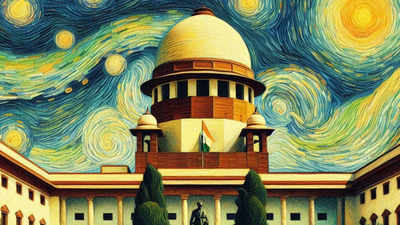- News
- India News
- Judges are also fallible, shouldn't shy away from accepting mistakes: Supreme Court
Trending
Judges are also fallible, shouldn't shy away from accepting mistakes: Supreme Court
The Supreme Court of India has recognized mistakes in its earlier order that provided protection to Indiabulls Housing Finance against debt recovery and money laundering cases. The court admitted it did not hear the Enforcement Directorate before issuing the restraint order. It has now modified this decision, allowing the High Court to handle interim protection matters.

This is an AI-generated image of the Supreme Court.
Over a year after SC passed an interim order granting protection to Indiabulls Housing Finance and its officials, and stayed proceedings of debt recovery and in money laundering cases against them, the court admitted "certain errors crept in its order by oversight".

Also read: 'Viewing 'child porn' is offence under Pocso, IT Acts,' says SC
The apparent mistake was that the restraint order was passed against Enforcement Directorate without granting a hearing to the agency, which sought modification of the order. The order, passed by Justice Krishna Murari and Justice Sanjay Kumar, had another flaw - it asked the parties to approach high court to raise their grievances, but at the same time granted interim protection that would continue during pendency of the case in HC.
Legal system acknowledges fallibility of judges: SC
Normally, Supreme Court's protection remains in place till the parties have approached high court, with the apex court leaving it to HC to take a decision on interim protection.
On Tuesday, a bench of Justice Sanjay Kumar and Justice Aravind Kumar acknowledged the twin errors and modified the order, saying the interim protection in recovery proceedings would be till the parties moved HC and then it would be for HC to decide on interim order.
Also read: 'Explain what steps you have taken on stubble burning,' Supreme Court asks CAQM
"The stay of proceedings granted by this court in the writ petition, in relation to the first three FIRs, was directed to continue till the disposal of the writ petitions to be filed before HCs. When a party is relegated to HC to pursue its remedies, it would not be proper, in the normal course, to bind the said HC with directions in relation to the proceedings to be impugned before such court. Ordinarily, this court would leave all issues open for the party so relegated to raise and pursue before HC," the bench said.
"Being the court of last resort, this court would not shy away from acknowledging any mistakes in its orders and would be ready to set right such wrongs," the bench said, allowing ED's plea, and withdrew the part of the order relating to the money laundering case it had passed on July 4 last year.
Referring to the SC judgment in V K Jain vs Delhi HC, the bench said, "Our legal system acknowledges the fallibility of judges. Though this observation was made in the context of judges of the district judiciary, it would be equally applicable to those in higher echelons of the judicial hierarchy. As courts of record, it is necessary that constitutional courts recognise errors that may have crept into their judicial orders and rectify the same when called upon to do so."
Justice Krishna Murari had superannuated in the interregnum.
End of Article
FOLLOW US ON SOCIAL MEDIA










